Most Recent Additions
Leila Al Shami
Challenging the Nation State in Syria
Syria’s current borders were drawn up by imperial map makers a hundred years ago in the midst of World War I as part of a secret accord between France and Britain to divide the Mideast spoils of the Turkish Ottoman Empire. As the colonial state gave way to the post-independence state, power was transferred from Western masters to local elites.
May 12, 2016 Read the whole text...
Fifth Estate Collective
Ammunition Books
Ammunition Books
4403 Second Ave.
Detroit, Michigan, 48201
Bookstore hours:
Mon. thru Fri. 1 pm — 5 pm
A SPECIAL NOTE!
For those of you who have been waiting for your copies of Chris Gray’s book, Leaving the 20th Century: The Incomplete Work of the Situationist International, we have just received a letter from a comrade in England saying that he has recently sent us 50 copies by surface mail. They should arrive here in about a month, at which time we shall mail it out to those who have ordered it. Sorry about the delay, and thanks for bearing with us.
May 2, 2016 Read the whole text...
Fifth Estate Collective
Hold the pickle, Hold your fire
(mock ad for Burger King)
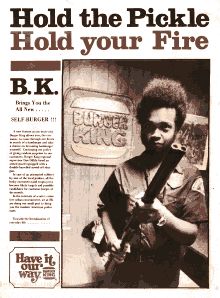
B.K. Brings You the All New SELF-BURGER!!!
A new feature at our inner-city Burger King allows you, the customer, to come through our doors in search of a hamburger and take a chance on becoming hamburger yourself! Continuing our policy of giving random surprises to our customers, Burger King regional supervisor Dan Dilldy hired an armed guard equipped with a double-barreled sawed-off shotgun.
May 2, 2016 Read the whole text...
Fifth Estate Collective
1,000 Rewards
Handbill
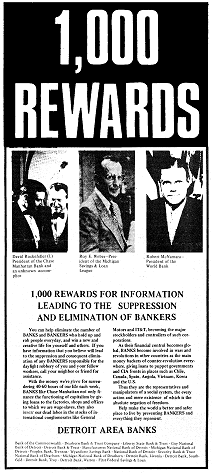
David Rockefeller (left) President of the Chase Manhattan Bank and an unknown accomplice
Roy E. Weber, President of the Michigan Savings & Loan League
Robert McNamara, President of the World Bank
THE SUPPRESSION AND ELIMINATION OF BANKERS
You can help eliminate the number of BANKS and BANKERS who hold up and rob people every day, and win a new and creative life for yourself and others. If you have information that you believe will lead to the suppression and consequent elimination of any BANKERS responsible for the daylight robbery of you and your fellow workers, call your neighbor or friend for assistance.
May 1, 2016 Read the whole text...
Bob Nirkind
Capitalism’s Industrial Plagues
“They mean to kill us all”
This article is the first in a two-part series on the effects that the indiscriminate handling and usage of radioactive waste materials and dangerous chemicals are having, and will have in the future, on human beings and their environment. Part One focuses on the results of chemical accidents and nuclear leakages in the United States and around the world. Part Two, Is Michigan Slated For Nuclear Landfill?, Fifth Estate #277, October 1976, will concern itself specifically with Michigan, and the Federal Government’s intention to test land here for the possible construction of a nuclear waste disposal system.
Apr 29, 2016 Read the whole text...
Fifth Estate Collective
Democracy
“Mistuh Chairman,” the fleshy faced delegate droned, “the Great State of Mississippi, last bastion of slavery, casts all of its redneck ballots for...CLICK!
“CLICK!” The sound was unmistakable—all over America, in cities and small towns, high-rise apartments and wooden shacks, people were busy flipping their television sets to another channel as the Republican party exposed itself on all three major networks for nearly a week of unending boredom.
Apr 29, 2016 Read the whole text...
Stuart Perry
Identity Crisis
1976—A national identification card, as well as 53 other “proposed solutions” to the problems of false identification, drug smuggling, fugitives, welfare abuse and check fraud are currently under debate by the Federal Advisory Committee on False Identification (FACFI), according to a recent issue of Counterspy magazine (Spring ’76).
Apr 29, 2016 Read the whole text...
Fifth Estate Collective
Open Letter To Judd Arnett & Lou Gordon
The Fifth Estate Staff Death Penalty for Newspaper Columnists
To: Judd Arnett, The Detroit Free Press
Lou Gordon, The Detroit News
Lift up a rock in Detroit these days—more correctly, in one of its outlying suburbs—and out will crawl a newspaper columnist.
Regarding your respective columns of August 25 in the Free Press and the News on the subject of street gang violence in the city: In general, when we have been forced to think about you at all, we’ve been inclined to think of you as just two more transparent apologists for the status quo. We’ve always felt it symptomatic of your distorted self-perceptions that you should think your banal and witless observations deserving of the least attention, and symptomatic of this sick society that it should pay you to make them public. We have thought of you, in other words, as fit only to be ignored.
Apr 29, 2016 Read the whole text...
Peter Rachleff
Westinghouse Wildcat
Pittsburgh Workers Battle Company, Union
By the beginning of the second shift on Monday July 12, the huge East Pittsburgh Works of the Westinghouse Electric Company was shut tight by a wildcat strike of production workers.
This was the first plant-wide walk-out in twenty years, the last being a six month strike in 1956 which ended in bitter defeat and demoralization. While this re-emergence of mass activity at this central plant (where some 9500 blue collar workers manufacture gigantic turbines) alone makes these events deserving of analysis, the actual unrolling of the strike presents some patterns more than worthy of consideration by those of us who seek the destruction of capitalist society in all of its forms.
Apr 29, 2016 Read the whole text...
Fifth Estate Collective
What is Detroit’s Toughest Gang?
Today’s gang quiz question is one that the gangs themselves have often fought over: which of them is the toughest? We’ll give you a few hints. It’s not the Black Killers, the Coney Oneys or any of the other teenage groups you’ve heard so much about in the last few weeks. Mayor Coleman Young has called them the “toughest gang in this city” and has warned the populace of them.
Apr 29, 2016 Read the whole text...
Fifth Estate Collective
Detroit Seen
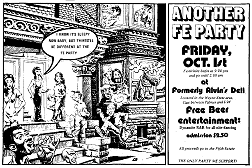
Once again we have to extend gratitude to our subscribers for their generous contributions to insure this paper’s continued existence. Every time we thought the flow of letters containing checks or cash had ceased, we would receive yet another with an explanation that the delay was due to a wait for an unemployment check or paycheck to arrive. It’s this sort of support that provides not only the money for us to continue, but also the motivation. Some of us felt that a notice of thanks this small is insufficient to thank those that provided the funds, but really the whole paper is our response...
Apr 28, 2016 Read the whole text...
Various Authors
Letters
Greetings!
Me, and some good comrades are being held prisoner in this pigsty called prison, and we came upon a copy of the April Fifth Estate. Needless to say, we are always trying to Fuck Authority, but there are no RICH around here to EAT, so we ate your newspaper, and that fucker sure was good food for thought.
Apr 28, 2016 Read the whole text...
Fifth Estate Collective
More on Tyler
Seventeen-year-old Gary Tyler, the young black student convicted and sentenced to death by an all white jury on a trumped-up murder charge, still sits waiting for release from Death Row in the Louisiana State Penitentiary. (see Fifth Estate #273 and #274 for more details.)
Rescued from the electric chair by the U.S. Supreme Court’s recent ruling on capital punishment—a ruling which approved the reconstitution of the death penalty under strict new guidelines—Tyler nonetheless is far from out of the woods.
Apr 28, 2016 Read the whole text...
anon.
PBB Found in Mother’s Milk
After being dropped by the media as no longer newsworthy, and being submerged in a myriad of bureaucratic committees on the State Legislature—a process so utterly boring that we have failed to follow its developments (you’ll forgive us, won’t you?)—the issue of PBB (polybrominated biphenyl, a component of a fire-retardant chemical which was introduced by mistake into Michigan livestock feed starting in 1973) has again hit the headlines, this time in a particularly gruesome development. (See “PBB: Case Study of an Industrial Plague,” FE May 1976).
Apr 28, 2016 Read the whole text...
Fifth Estate Collective
Cop Gang vs. Street Gangs
Gang fever is sweeping Detroit. Everywhere the gangs are the main topic of conversation—the Black Killers, the Errol Flynns, the Coney Oneys, the Chene Gang. The cops are puffed with importance—they’re the thin blue line between the hordes and the populace; the media are ecstatic—they have found a story that can be milked every day to break the monotony regularly presented; and for the average citizen: a concrete discernible reason for why Detroit is falling apart—1,000 teenage gang members.
Apr 25, 2016 Read the whole text...
Fifth Estate Collective
Have a Wild Summer!
1995 Summer Gatherings & Actions
Through September 2
A traveling RV-gypsy gathering that will join with local people in 14 cities across North America to create temporary autonomous zones, make art, cook food, establish squats, play music, celebrate, & protest. For a complete list of cities, call Arrow at 212/ 614–0393 or write: 209 E. 7th St., NY, NY:
Apr 18, 2016 Read the whole text...
Various Authors
Letters to the Fifth Estate
Dear Friends:
The Primitivist Network aims to promote networking of broadly defined anarcho-primitivists. The network is not an organization and has no fixed ideological line. It is designed to act merely as a means of fostering contact between like-minded people with the aim of generating projects that are broadly anarcho-primitivist in nature.
Apr 18, 2016 Read the whole text...
R. Relievo (Rob Blurton)
R. Yamada
Bombing Civilians
A moral surrender to the Nazis? (Letter exchange)
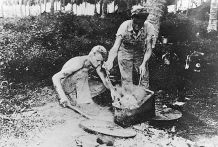
After reading your articles in FE #345, Winter 1995 on the dropping of the atomic bombs on Japan, I couldn’t help but feel a little bit of historical and moral context was needed to balance the distortion contained therein.
Apr 17, 2016 Read the whole text...
anon.
McLibel Trial Continues
Demos Mark Junk Food King’s 40th Birthday

April 15 marked the 40th anniversary of the opening, in Des Plaines, Illinois of the first McDonald’s Hamburger Corporation restaurant. Helen Steel and Dave Morris, defendants in the United Kingdom McDonald’s libel trial, flew to the U.S. to join an alternative, anti-birthday celebration in the Chicago suburb.
Apr 17, 2016 Read the whole text...
John Zerzan
A Gorilla Takes On Civilization--Sort Of
Book review
a review of
Ishmael, Daniel Quinn, 1993, Bantam/Turner, New York, 262 pp., $6.00.
Ishmael is a gorilla who places classified ads in search of those who would learn “how to save the world.” The narrator of Daniel Quinn’s critique of civilization is the (human) applicant to Ishmael’s one-gorilla school on what went wrong with humanity. In Socratic dialogue-type style, the nameless student learns the story of how Homo lived as a “Leaver” for two or three million years, only to become a planet-destroying “Taker” in the last 10,000 years.
Apr 15, 2016 Read the whole text...
Fifth Estate Collective
FE Announcements
Los Angeles’ (De)Center is an autonomous, non-profit, collectively organized space providing access to anarchist ideas and culture, open daily 3-7pm. It offers hard to find anarchist and radical books, periodicals, zines, CDs and tapes and t-shirts. There are regular political events, a film series, and a Tuesday night coffeehouse. (De)Center is at 6122-1/2 N. Figueroa, Los Angeles CA 90042; phone (213) 344–7017.
Apr 15, 2016 Read the whole text...
Fifth Estate Collective
Fifth Estate Books
Bolo Bolo, Anarchy Comix & other FE Favorites
SOCIETY AGAINST THE STATE by Pierre Clastres
Can there be a society that is not divided into oppressors and oppressed, or that refuses coercive state apparatuses? In this beautifully written book Pierre Clastres offers examples of South American Indian groups that, without hierarchical leadership, were both affluent and complex. In so doing, he refuses the usual negative definition of tribal society and poses its order as a critique of Western society.
Apr 15, 2016 Read the whole text...
Fifth Estate Collective
News & Reviews
Both of the best selling issues of this newspaper, our 1970 Special Women’s Issue, which had to be reprinted three times to meet the demand for it, and our recent Queer Anarchy edition met with high acclaim for their coverage of gender issues. However, each was met with criticism for being “sectoralist” or even “pornography” in the case of the later edition.
Apr 15, 2016 Read the whole text...
John Filiss
Bey Pamphlet
Let-down from TAZ
a review of
Radio Sermonettes, Hakim Bey, The Libertarian Book Club, (339 Lafayette St., Room 202, New York NY 10012), 40 pp., $3.50.
Hakim Bey’s earlier work, along with his more recent Radio Sermonettes, reflects the outlook of one who has centered himself in two often disparate schools of thought—Eastern mysticism and anarchism. And, while the (sometimes) richness of these two fields should promote an interesting cross-fertilization, Bey’s oft inability to pare down to the vital essence of the ideas he works with has seriously hindered his accomplishments.
Apr 9, 2016 Read the whole text...
Neither East Nor West/NYC
On Gogol Boulevard
On Gogol Boulevard is produced for the Fifth Estate by New York City/Neither East Nor West, which links alternative oppositions in the East and West, and prints news and documents unavailable in the corporate or left media. OGB sometimes involves Third and Fourth World activists in these efforts. A similar section also appears in Black Fist.
Apr 9, 2016 Read the whole text...
John Zerzan
PBS, Power & Postmodernism
The Public Broadcasting System produces “programming” toward a more manageable society. In fact, it is the network rather expressly for managers, and what it airs can best be understood by keeping in mind this service to the managing class. The exact ration of corporate to government funding of PBS is inconsequential to its basic nature and function.
Apr 9, 2016 Read the whole text...
Ellen Carryout
TAZ, the Album
Subversive Act or Active Sell-out?
a review of
TAZ: The Album, Hakim Bey, Axiom Records, 1994
When I first discovered that anarchist author Hakim Bey had released an album of readings on the Axiom label, a subsidiary of the corporate monolith Island Records, I was both eagerly fascinated and smugly repelled. It would be easy to scoff at what, on the surface, seems like a calculated sell-out.
Apr 9, 2016 Read the whole text...
Alon K. Raab
The Centralia Massacre
Following World War I a Wobbly is lynched by the American Legion
As we travel north on Oregon’s Highway Five, from Portland towards Seattle, places and names go by: Castle Rock, Cougar, Mt. St. Helens, Onalaska. A November rain is falling, light rain, blessed rain. We cross the Chehalis river and then approach Centralia, Washington.
There are places whose names remain connected with the past, with a specific event that will forever remind strangers of their existence. Bhopal, Selma, Auschwitz, Soweto and Chernobyl are such places. People begin lives anew on those sites, building houses, giving birth, loving, but the associations persist. Centralia also has its beast of memory.
Apr 9, 2016 Read the whole text...
Fifth Estate Collective
Paul Avrich
Attilio Bortolotti, 1903–1995
He Lived for the Ideal

Attilio Bortolotti died of pneumonia on February 10, 1995, in a nursing home near Toronto. He was born on September 19, 1903, in Codroipo, Friuli, Italy, the fifteenth of eighteen children of Luigi Bortolotti, a builder, and Maria Pittana.
Tilio emigrated to Canada in 1920 and became active in the anarchist and antifascist movements in Windsor and Detroit during the agitation for Sacco and Vanzetti. Arrested in Detroit in 1929 for distributing a leaflet announcing a Sacco-Vanzetti meeting, he was held for deportation to Italy, but jumped bail and fled to Toronto. There he worked as a tool-and-die maker and resumed his anarchist activities, editing Il Libertario from 1933 to 1935 and The Libertarian in 1968 and 1969.
Mar 22, 2016 Read the whole text...
Fifth Estate Collective
Detroit Seen
Welcome to the long time coming Summer edition of the Fifth Estate. It is our first since the Winter 1995 issue which was published Dec. 31, 1994. Subscribers (and particularly libraries) frequently think they have missed issues when six months go by between our papers. For instance, they’ll understandably inquire, “Where’s the Spring 1995 edition?” although there wasn’t one.
Mar 22, 2016 Read the whole text...
Pablo Routledge
The UK Struggle Against Roads
Ecopolitics & the Free State: The Conflict Over the M77 Motorway in Scotland

Just to the south of Glasgow, amid the woodlands and park lands of Pollok estate, a site of extraordinary resistance has emerged.
From the roadside, a huge red banner with bright yellow letters proclaims “Pollok Free State,” and where the road gives way to a dirt track, amid tall beech trees, one enters a place transformed.
Mar 15, 2016 Read the whole text...
Andrei Codrescu
Armageddon to Some
Disarming Dead Gods
The people eagerly awaiting Armageddon, from religious fundamentalists to paranoid Nazis, have no choice but to wish a fiery end. They’ve been such failures in this world, only the end of it can justify their miserable, creepy existence.
The fact is that their world has already ended, a long time ago, despite their protophilosophy’s occasional spurts of life. The apparent strength of fanatics from Iran to Michigan is no more than the jerky motions of a corpse animated by electric shocks. The God buried by Nietzsche in the last century found scores of other gods in that grave: one of humanity’s best tricks is the invention and disposal of gods.
Mar 14, 2016 Read the whole text...
anon.
Execution Date Set for Mumia Abu-Jamal
Pennsylvania Governor Acts To Condemn Activist As His Appeal Is Filed & His Book Is Released
On June 12, Pennsylvania Gov. Thomas Ridge signed a death warrant for Mumia Abu-Jamal—meaning that unless a judicial stay is granted, he’ll be executed in the state’s electric chair at 10 p.m. on Aug. 17.
[News came as we were going to press that San Francisco police attacked a peaceful Free Mumia demonstration June 26 in San Francisco’s UN Plaza. Police charged 270 people with felony arson, riot and jaywalking. Several demonstrators were beaten including journalists.]
Mar 14, 2016 Read the whole text...
E.B. Maple (Peter Werbe)
Mad Bombers & Anarchy?
Oklahoma City and the Unabomber
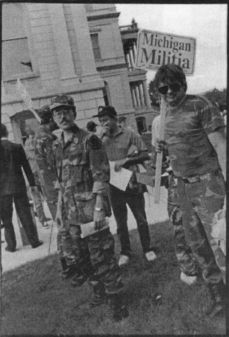
We live in a world where television announces what is important and solemnly pronounces how loyal citizens are to respond—patriotism: the Gulf War; mourning: the death of the war criminal Nixon; joy: the Olympics; or indignation: the Oklahoma City bombing. The public is inundated with carefully selected images, which are dropped as soon as they fulfill their function of affirming the ruling scheme of things.
Mar 14, 2016 Read the whole text...
Alec Smart
Police Break London Anti-Road Blockade
LONDON (Special to the Fifth Estate)—The last remaining group of 25 houses in the path of a contested road construction in London were cleared and bulldozed late last year.
The “No M11 Link Campaign” created Operation Roadblock to stop work on Claremont road in Leytonstone, an East London working class district situated on the southern end of a seven kilometer construction project linking the M 11 motorway from Wanstead to the Blackwall Tunnel.
Mar 14, 2016 Read the whole text...
Fifth Estate Collective
Tales From The Planet

Proving our contentions a few issues ago that, “all money is fake,” a ring of Iranian and Syrian high tech counterfeiters have been printing $100 bills at a clip faster than the government. The quality of these bills is so good that for a while they were honored by the Federal Reserve when submitted for collection.
Mar 14, 2016 Read the whole text...
Fifth Estate Collective
Waldheim Cemetery Bankrupt, Haymarket Monument Defaced
Chicago’s famed Waldheim Cemetery, final resting place for anarchists such as Emma Goldman, Lucy Parsons, and Voltarine DeCleyre, has been plundered of its liquid assets and is now in bankruptcy. Waldheim is also the site of the crypt and monument to the Haymarket martyrs, four labor activists and anarchists murdered by the state of Illinois in 1887. The Martyrs Monument, which has often been vandalized by political graffiti, now has suffered the outrage of metal thieves.
Mar 14, 2016 Read the whole text...
Various Authors
Letters
Our readers respond
Send letters to fe--at--fifthestate--dot--org or Fifth Estate, POB 201016, Ferndale MI 48220. All formats accepted including typescript & handwritten; letters may be edited for length.
Enclosed is $30. Please send us a bundle of the Summer 2015 Vietnam issue. Thank you for putting out this paper! Printed propaganda is where it’s at!
Mar 9, 2016 Read the whole text...
Various Authors
Poetry
One day in the prison yard, the resident grey cat chased heedlessly
A bird, who’d landed on the roof, all enclosed with steely swirls
And slipping through the curling razor wire, stalked
Until it caught her leg and stopping
Shaking as it sliced her paw...open...raw
The sharp barbs cutting fur and muscle, white and wounded to the bone
Mar 9, 2016 Read the whole text...
Walker Lane (Peter Werbe)
First Iraq Mutiny
As War Drags on, Will There Be More?
Mutiny. This word, fearsome to the brass of any army (but joyful to anti-war activists), was left out of October 2004 media accounts about a US Army Reserve unit whose soldiers refused to deliver fuel along a route in Iraq they considered too dangerous to travel.
Eighteen soldiers, including the commander of the 343rd Quarter-master Company, refused to under-take a fuel delivery north of Baghdad in what they characterized as a “suicide mission,” given the frequency of attacks and the lack of armor for their unit. The commander was relieved of duty with the hope that the entire incident could be swept under a rug already showing great bulges from previous sweepings.
Mar 8, 2016 Read the whole text...
Barry Pateman
The Spanish Revolution 70 years later
Fifth Estate history
And, so we return to Spain. Nearly 70 years after the people’s response to a right-wing military uprising, those events remain a source of wonder, optimism, confusion, strife and tragedy. It was a high mark of personal and social possibility that has yet to be matched. It was a real revolution of everyday life that shattered the patterns and relationships created by the agencies that constituted a growing capitalism.
Mar 8, 2016 Read the whole text...
Fifth Estate Collective
What is Capital?
Fifth Estate history
Let us give a brief definition of the way in which Capital or capitalism is used in articles in the Fifth Estate: Capital is based on wage-labor, the production and exchange of commodities, with an agency above the working class extracting surplus value (profits) from the value of goods and services produced, and then re-investing a portion back into the enterprise.
Mar 8, 2016 Read the whole text...
Mitzi Waltz
Anarchist Response to Disability
Fifth Estate History
Foucault’s happy pre-Enlightenment “ship of fools” was a fantasy: the reality of life with disability (particularly developmental disability and mental ill health) before charitable/government involvement ranged from outright murder, to banishment into charitable and religious institutions, to imposing the full duty of care on women within the confines of the family home. All of these practices continue alongside government and corporate services today.
Mar 7, 2016 Read the whole text...
Fifth Estate Collective
Jane Fonda & the Anti-Aircraft Gun

So intense was the air war against Vietnam, known as Operation Rolling Thunder, that more bomb tonnage was dropped on this small nation than the combined total expended during World War II.
These raids contributed heavily to the enormous Vietnamese casualties ranging up to four million dead, numbers which dwarf those suffered by the U.S. invaders.
Mar 7, 2016 Read the whole text...
Fifth Estate Collective
On Organization
Fifth Estate history
The question of whether to combine in organizations, associations, federations, etc., has become a subject of some debate and much interest. Many feel that the only obstacle to organization is the relative weakness of the small numbers of persons who identify with a libertarian perspective, while still others feel organizations in and of themselves are bureaucratic and are incapable of producing the desired goal.
Mar 7, 2016 Read the whole text...
Fifth Estate Collective
Vietnam: Resistance to an Imperial War
Issue Theme intro
We are all outlaws in the eyes of America...
We are obscene lawless hideous dangerous dirty violent and young...
We are forces of chaos and anarchy
Everything they say we are we are
And, we are very Proud of ourselves
—“We Can Be Together” (Jefferson Airplane, from “Volunteers,” 1969)
And, traitorous.
Mar 7, 2016 Read the whole text...
Various Authors
Anarcho-Shorts
& Other Tales of the Planet
by Ken Wachsberger
Preceding the Fifth Estate by two weeks, the Berkeley Barb celebrated its fiftieth anniversary with exhibits, films, poetry, and panel discussions on August 9, 2015.
The two papers were among the first five members of the Underground Press Syndicate. The Barb was known for its radical news coverage, outrageous visuals, support for liberation movements, and its explicit sex ads.
Mar 6, 2016 Read the whole text...
Fifth Estate Collective
Contents of print edition
4 The Future is Now!
Jesús Sepúlveda
7 Sabotage & the Flows of Capital
Jeff Shantz
10 Transgender Struggle in Prison
Anonymous
12 Image Worshipping
Panos Papadimitropoulos
13 Mega-Cities
Bellamy Fitzpatrick
16 Wolf Patrol
Rod Coronado
Vietnam: The Resistance
Pages 17–30
Mutinies at the Outposts of Empire
Rob Blurton
Mar 6, 2016 Read the whole text...
Fifth Estate Collective
Escaping from Europe
Fifth Estate History
The discovery of Columbus by the Arawaks was fortuitous as the three ships might have made landfall almost anywhere else on the continent that lay between the explorers’ intended destination in eastern Asia. The random meeting had deadly consequences for the tribal people who had cheerfully welcomed their strange visitors.
Mar 6, 2016 Read the whole text...
Fifth Estate Collective
Issue intro
The FE at 50
Just so readers don’t think all of the celebration around the 50th anniversary of publishing has brought forth a bout of hubris in us, let us be clear. Those of us working on the Fifth Estate today know this publication couldn’t have lasted this long without connection to a vibrant tradition and social solidarity from contemporary comrades.
Mar 6, 2016 Read the whole text...
